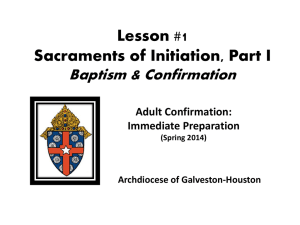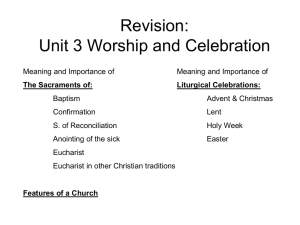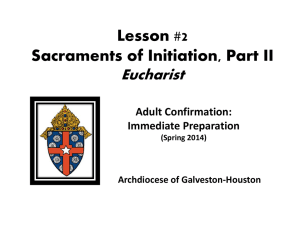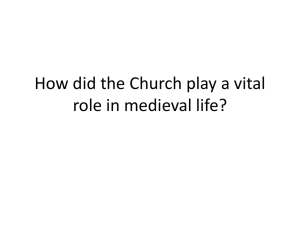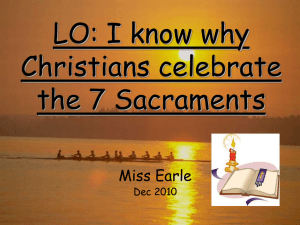2nd Grade Religion _ Scope and Sequence
advertisement
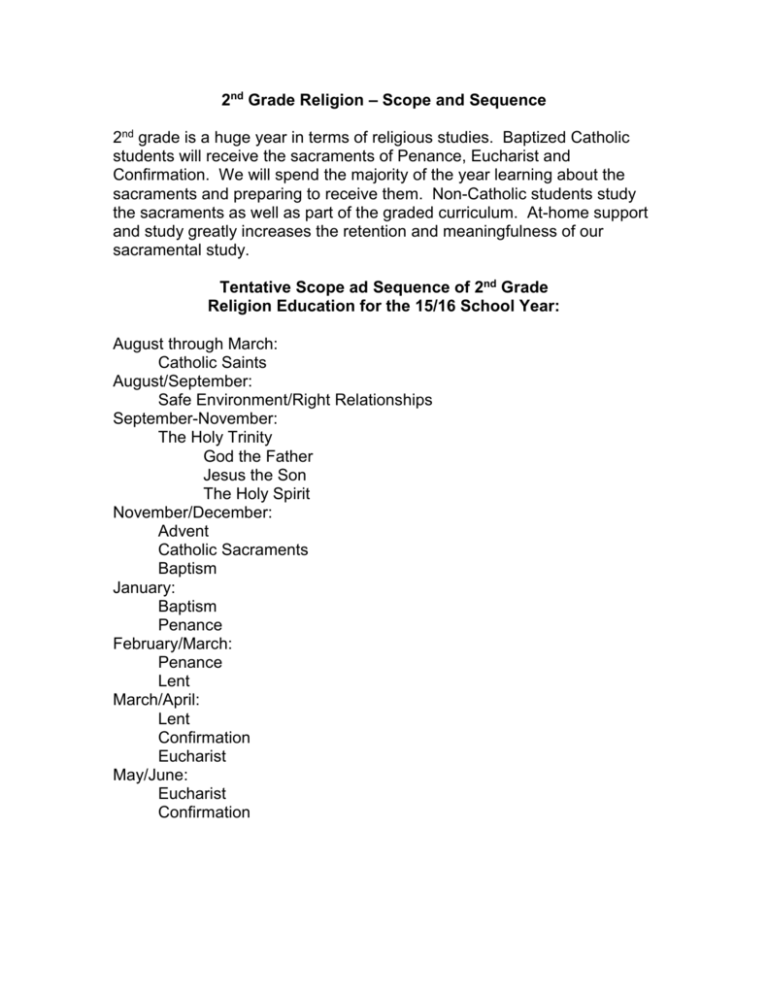
2nd Grade Religion – Scope and Sequence 2nd grade is a huge year in terms of religious studies. Baptized Catholic students will receive the sacraments of Penance, Eucharist and Confirmation. We will spend the majority of the year learning about the sacraments and preparing to receive them. Non-Catholic students study the sacraments as well as part of the graded curriculum. At-home support and study greatly increases the retention and meaningfulness of our sacramental study. Tentative Scope ad Sequence of 2nd Grade Religion Education for the 15/16 School Year: August through March: Catholic Saints August/September: Safe Environment/Right Relationships September-November: The Holy Trinity God the Father Jesus the Son The Holy Spirit November/December: Advent Catholic Sacraments Baptism January: Baptism Penance February/March: Penance Lent March/April: Lent Confirmation Eucharist May/June: Eucharist Confirmation 2nd Grade Religious Education Overview The summaries and links provided are meant to help families stay abreast of what we’re covering in religion, and to empower parents as the primary faith educators of their children. Please contact me at slemcke@utmcs.org with any questions about 2nd grade’s religion curriculum. For families who aren’t Catholic, I encourage you to go over religion materials that come home on a regular basis and compare and contract your family’s personal beliefs with what we cover in class. All students, regardless of faith, attend religious education at every grade level, and are graded upon their knowledge and understanding of the content. Catholic Saints In class, we define saints as “people who have a special relationship with God.” Catholic saints are venerated for exceptional piety or actions during their lives. Catholics believe that saints intercede on our behalf in prayer. In class, we’ll focus on a variety of Catholic saints on a regular basis for the first semester and beyond as a means of familiarizing students with different saints to aid in their choice for their Saint research project in March, as well as Confirmation patron saints for students who are Catholic. All students will choose and research a Catholic saint and prepare a response project about what they learned and why they’re interested in a particular saint. Catholic students will research their Confirmation patron saint. For students who aren’t Catholic, they will pick a saint who interests them. All second graders, regardless of faith, will complete the research assignments and will be graded on their work. For more information on Catholic saints, please visit http://catholicism.about.com/od/thesaints/f/What_Is_A_Saint.htm or http://www.catholic-saints.info Safe Environment/Right Relationships The Safe Environment/Right Relationships program was established by the Diocese of Salt Lake after the United States Conference of Catholic Bishop’s Charter for the Protection of Children and Young People’s call to better educate students in recognizing the harmful actions of others and empowering students to seek out help in vulnerable situations. Students in Catholic schools and religious education receive Safe Environment training every year. For more information on Safe Environment Training, please visit https://www.dioslc.org/safe-environment The Holy Trinity Catholics believe that the Holy Trinity – God the Father, Jesus the Son, and the Holy Spirit – are three distinct beings, but all constitute one God. Catholics believe God to be the creator of everything and without origin. Catholics believe Jesus was begotten by God, but is also fully God and fully man. Catholics believe the Holy Spirit to be a being which expresses and carries out God’s will. For more information on the Holy Trinity, please visit http://www.newadvent.org/cathen/15047a.htm Advent and Lent Advent is the beginning of the Catholic liturgical calendar. It covers the four Sundays prior to Christmas, and is the season of preparation for the birth of Christ. The Christmas season begins on December 25th and concludes with the Feast of the Baptism of the Lord. Lent is the roughly six weeks before Easter, and is a solemn time of prayer, sacrifice and service. It concludes with Holy Week, where we remember Jesus arriving in Jerusalem, celebrating his Last Supper, and his arrest and death on the Cross. Catholics believe Jesus resurrected from the dead on Easter Sunday. The Easter season lasts about seven weeks, and concludes with Pentecost Sunday, where Catholics believe Jesus’ disciples were filled with the Holy Spirit. Please visit http://www.usccb.org/prayer-and-worship/liturgical-year/advent/ and http://www.usccb.org/prayer-and-worship/liturgical-year/lent/ for more information. Catholic Sacraments Catholics celebrate seven sacraments, three of which many 2nd graders will receive this year: -Baptism: The first of the three sacraments of initiation. -Confirmation: the 2nd sacrament of initiation -Eucharist (Communion): The 3rd of the sacraments of initiation -Penance (Confession, Reconciliation) -Anointing of the Sick -Matrimony -Holy Orders Students who are baptized Catholics will receive Penance, Eucharist and Confirmation this year. However, all students, regardless of faith, will study the sacraments alongside their Catholic classmates and are expected to understand the purpose behind the sacraments. Our primary sacramental focus this year will be on Baptism, Penance, Confirmation and Eucharist. We’ll define sacraments in general as signs of God’s love and grace, and ways for us to become closer to Him. The focus of our baptism study is on baptism as a welcoming sacrament, which brings us into the community of the Church. In Penance, we’ll focus on what sin and forgiveness are, and how we can ask God’s forgiveness and guidance to help up make the right decisions or help to heal past mistakes. In Eucharist, we’ll focus on how Catholics believe that we receive the Body and Blood of Christ through transubstantiation, and that the Church gathers as a community to share a meal in remembrance of Christ. In Confirmation, we’ll focus on how we recognize that all people can carry out the gifts of the Holy Spirit, and how Confirmation blesses us and acknowledges those abilities. The gifts of the Holy Spirit are wisdom, knowledge, piety, Fear of the Lord, counsel, fortitude, and understanding. Please visit http://www.americancatholic.org/features/special/default.aspx?id=29 and http://www.beginningcatholic.com/sacraments.html for more information. Required Prayers/Tentative Study/Due Dates All second graders, regardless of religion, are tested and graded on retaining prayers and Mass responses. The choir and altar servers plays an important leadership role in responding during Masses, and preparing early is essential for students, regardless of faith. Exact due dates will be sent home with homework, and students will practice prayers and responses in class and at home for about a month per assignment. The Prayer of the Penitent (January/February) My God, I am sorry for my sins with all my heart In choosing to do wrong, and failing to do good, I have sinned against You, whom I should love above all things I firmly intend, with Your help, To do Penance, to sin no more, And to avoid whatever leads me to sin. Our Savior Jesus Christ suffered and died for us In His name, my God, have mercy. Mass responses: Confiteor (March/April) I confess to almighty God and to you, my brothers and sisters, that I have greatly sinned in my thoughts and in my words, in what I have done, and in what I have failed to do; through my fault, through my fault, through my most grievous fault; therefore I ask blessed Mary ever-Virgin, all the Angels and Saints, and you, my brothers and sisters, to pray for me to the Lord our God. Apostles Creed (May/June – studied, but not required to memorize) I believe in God, the Father Almighty, Creator of heaven and earth; and in Jesus Christ, His only Son, our Lord: Who was conceived by the Holy Spirit, born of the Virgin Mary; suffered under Pontius Pilate, was crucified, died and was buried. He descended into hell; the third day He rose again from the dead; He ascended into heaven, is seated at the right hand of God the Father Almighty; from thence He shall come to judge the living and the dead. I believe in the Holy Spirit, the Holy Catholic Church, the communion of Saints, the forgiveness of sins, the resurrection of the body, and life everlasting. Amen. Sanctus (November) Holy, Holy, Holy Lord God of hosts. Heaven and earth are full of your glory. Hosanna in the highest. Blessed is he who comes in the name of the Lord. Hosanna in the highest. Angus Dei (October) Lamb of God, you take away the sin of the world, have mercy on us. Lamb of God, you take away the sin of the world, have mercy on us. Lamb of God, you take away the sin of the world, grant us peace. Lord I am not worthy (August/September) Lord, I am not worthy that you should enter under my roof But only the say the word and my soul shall be healed Sacrament Eligibility Criteria Students must be baptized Catholics in order to receive the sacraments of Penance, Confirmation and Eucharist. Catholic students receiving Confirmation (Confirmandi) will choose a sponsor. Sponsors are-confirmed Catholics -16 or older -not the parent of the confirmandi -considered to be an excellent role model in faith formation and life -required to obtain permission from their parish pastor -can be the baptism godparent of the confirmandi Sponsors will need permission from their parish priest – see attached form. CATECHETICAL PURPOSE “Catechesis aims to bring about in the believer an ever more mature faith in Jesus Christ, a deeper knowledge and love of his person and message, and a firm commitment to follow him. “ (NDC, 19A) “The fundamental task of catechesis is to achieve…the formation of disciples of Jesus Christ. Jesus instructed his disciples; he prayed with them; he showed them how to live; and he gave them his mission.” (20) The parish religious education program: Promotes knowledge of the faith. Explains the meaning of the liturgy and the sacraments. Instructs people in the teachings of the Church and promotes moral formation in Jesus Christ. Teaches the Christian how to pray with Christ. Prepares the Christian to live in community and to participate actively in the life and mission of the Church. Promotes a spirit of Christ that prepares the faithful to be witnesses as Christians in today’s society.(20, 1-6) The mission of Catechesis is “to propose the Christian faith in its entirety and in its authenticity, in accordance with the Church’s understanding.” (GDN No. 175) “In this catechesis, the Church recognizes and celebrates the diversity within the community of faith, affirms the fundamental equality of every person, and acknowledges the need for charity, mutual respect, and justice among all groups in a pluralistic society in ushering in the Kingdom of God.” (NDC, No. 52)

